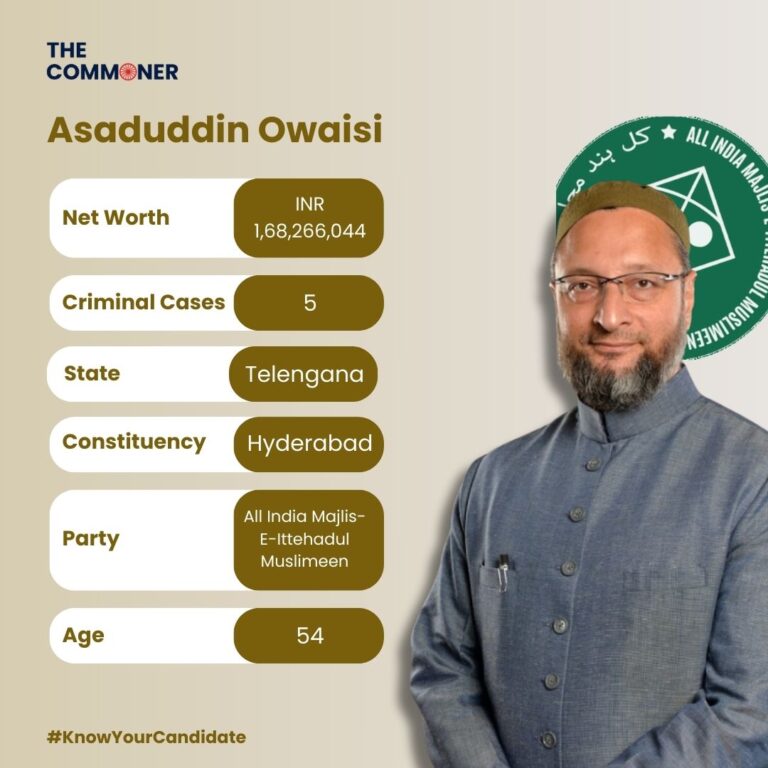The Rise & Influence Of Asaduddin Owaisi: A Journey Of Passion, Perseverance, & Purpose

You want Muslim votes but don’t want to talk about them’: Asaduddin Owaisi
Source: Elections News – The Indian Express
Born and raised in the historic city of Hyderabad, Asaduddin Owaisi, the dynamic founder of the All India Majlis-e-Ittehad-ul-Muslimeen (AIMIM), has carved a niche for himself in the complex landscape of Indian politics. Owaisi’s journey from a young, passionate lawyer to a prominent political figure is a testament to his dedication to the causes of minority rights, social justice, and economic empowerment.
Early Life and Political Legacy
Asaduddin Owaisi was born into a family with a profound political legacy. His father, Sultan Salahuddin Owaisi, was a renowned politician who served multiple terms as a Member of Parliament (MP) for the Hyderabad constituency. The elder Owaisi, known for his strong advocacy of minority rights, laid the groundwork for his son’s future in politics. Growing up in such an environment, Asaduddin was naturally inclined towards public service and political engagement.
In 1994, at the age of 25, Asaduddin Owaisi made a significant entry into politics by becoming the youngest Member of the Legislative Assembly (MLA) in Andhra Pradesh, representing the Charminar constituency in Hyderabad.
Legal Career and Advocacy
Before diving headfirst into politics, Owaisi had pursued a career in law, where he had developed a reputation for fighting for the rights of the minorities. His legal background has been instrumental in his political career, providing him with the skills to navigate complex legal and constitutional issues. One of his notable legal battles was his defense of the right to freedom of speech and expression in the Supreme Court, particularly concerning his controversial remarks on the chanting of “Bharat Mata ki Jai.”
Parliamentary Career and Leadership
Asaduddin Owaisi succeeded his father as the MP for Hyderabad in 2004. Since then, he has successfully retained his seat in subsequent elections, demonstrating his strong connection with the electorate and his effectiveness as a leader. Under his leadership, AIMIM has not only consolidated its position in Hyderabad but has also expanded its influence to other states, including Maharashtra and Bihar.
Owaisi’s parliamentary career is marked by his vocal advocacy for minority rights and social justice. He has been a staunch critic of policies and legislations that he perceives as discriminatory against minorities. His speeches in Parliament are known for their eloquence, depth, and fearless critique of the government’s policies.
Champion of Minority Rights
Throughout his career, Owaisi has been deeply connected to the issues faced by his community. His leadership of AIMIM has brought minority rights to the forefront of national conversation. He has consistently called for better representation and protection of minorities in various spheres of life, including education, employment, and politics. Owaisi’s advocacy is not limited to Muslims alone; he has spoken out for Dalits and other marginalized communities, emphasizing the need for an inclusive and equitable society.
One of Owaisi’s significant contributions is his emphasis on education and economic empowerment. He believes that education is a powerful tool for social change and has worked towards improving educational opportunities for the underprivileged. His initiatives in Hyderabad have included the establishment of schools and scholarships for deserving students.
Controversies and Criticisms

Asaduddin Owaisi dismisses ‘two wives’ rumors
Source: The Siasat Daily – Archive
Asaduddin Owaisi’s political journey has not been without controversies. His outspoken nature and firm stance on issues often attract criticism from various quarters. His remarks on sensitive topics have sometimes sparked nationwide debates. However, Owaisi remains undeterred by criticism, viewing it as part of the larger struggle for justice and equality.
One such controversy was his stand on the chanting of “Bharat Mata ki Jai.” Owaisi argued that patriotism should not be judged by slogans but by actions and commitment to the country’s constitutional values. This stance, while controversial, underscored his belief in the diversity of expressions of patriotism and the importance of upholding individual rights.
His political career has also been marked by several legal challenges:
- 2009: Charged with chasing and beating up a polling agent of the Telugu Desam Party (TDP). This incident highlights the intensity of political rivalries and the confrontational nature of electoral politics.
- 2013: Detained for organizing a rally without permission and carrying a gun without a license in Bidar, Karnataka. This case underscores the issues of maintaining public order and the regulations surrounding political gatherings.
- 2014: Delivered a speech allegedly containing hate against PM Narendra Modi, seeking the Muslim community’s support for his party. This illustrates the contentious nature of communal politics and the impact of inflammatory rhetoric.
- 2015: Made controversial remarks stating that every child in the world is born as a Muslim and is converted to other religions by parents and society. Such statements reflect the complexities and sensitivities surrounding religious identity in India.
- 2016: Surrendered before Hyderabad police for allegedly leading a mob assault against Telangana Indian National Congress legislators. This incident again emphasizes the violent dimensions of political rivalries and the challenges of maintaining decorum among political leaders.

Complaints filed against Owaisi for his ‘Jai Palestine’ chant while taking oath as MP – The Week
Each of these cases reflects the broader themes of political rivalry, communal tensions, and the challenges of navigating India’s complex social and political landscape. Despite these legal battles, Owaisi continues to be a vocal and influential figure in Indian politics, highlighting his resilience and commitment to his political ideology.
Accessibility and Grassroots Connection
Beyond his political accomplishments and controversies, Asaduddin Owaisi is known for his accessibility and grassroots connection. He is often seen interacting with his constituents, listening to their concerns, and working towards practical solutions. This approach has endeared him to many in his constituency, who see him as a leader who truly cares about their issues.
Owaisi’s regular public meetings and community engagements have built a strong rapport with the people of Hyderabad. His ability to connect with ordinary citizens, understand their problems, and address their needs is a significant aspect of his leadership style.
Expanding Influence and Future Prospects
Under Owaisi’s leadership, AIMIM has gradually expanded its influence beyond Hyderabad. The party’s success in recent state elections, particularly in Maharashtra and Bihar, indicates its growing appeal among voters looking for an alternative to the traditional political parties. This expansion is part of Owaisi’s broader strategy to build a national presence for AIMIM and advocate for minority rights on a larger scale.
Looking ahead, Asaduddin Owaisi’s role in Indian politics is likely to become even more prominent. His ability to articulate the concerns of minorities and his commitment to social justice make him a key player in shaping the future political discourse in India. As AIMIM continues to grow, Owaisi’s influence is expected to extend further, potentially transforming the party into a significant force in Indian politics.

Conclusion
Asaduddin Owaisi’s journey from a young lawyer to a prominent political leader is a story of passion, perseverance, and purpose. His unwavering commitment to minority rights, social justice, and economic empowerment has made him a vital voice in Indian politics. Despite the controversies and criticisms, Owaisi’s leadership and vision continue to inspire many, making him a pivotal figure in the quest for a more inclusive and equitable India. As the political landscape evolves, Asaduddin Owaisi’s contributions and influence will undoubtedly leave a lasting impact on the nation’s democratic fabric.

